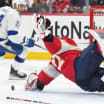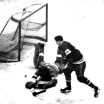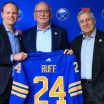ANAHEIM -- One night almost 18 years ago, Sudarshan Maharaj picked up the telephone with a goaltender in tears on the other end.
It was New York Islanders rookie Steve Valiquette from Atlanta. Moments earlier, Valiquette made 37 saves for his first NHL win, a 4-2 victory against the expansion Atlanta Thrashers on March 16, 2000.
Persistence pays off for Maharaj with Ducks
Goaltending coach rewarded after long road from Trinidad

By
Lisa Dillman @reallisa / NHL.com Staff Writer
Valiquette spent the previous two summers working with Maharaj, a goaltending consultant, to improve his skills. Those lessons, said Valiquette, were largely responsible for launching his NHL career.
RELATED: [Hockey Is For Everyone daily digest | Hockey Is For Everyone home]
And so when Valiquette made it, he immediately knew what he had to do.
"I called to thank Sudsie even before I called my parents," Valiquette said. "I rushed outside as our team was getting on the bus and I started to cry. I'm on the corner of the street crying and he's saying, 'Steve, you just look like you belong out there. I'm so proud of you.'
"If not for Sudsie, I'm not talking to you today, because I would have never been in pro hockey."
Maharaj, now in his second season as Anaheim Ducks goaltending coach, hasn't forgotten that night either.
"I was really touched by it because he took the time to call me and thank me," Maharaj said. "I'm grateful for the gratitude that he's shown me, but I also have gratitude for him because it was through that connection that allowed me to get a job with the Islanders."
Valiquette and Maharaj made history in their respective ways. That night, Valiquette, 6-foot-5, became the tallest goaltender to appear in an NHL game, according to Elias Sports Bureau. He would play 46 NHL games with the New York Rangers, the Islanders and the Edmonton Oilers.
And Maharaj, who was born in Trinidad but moved to Toronto at age 6, would go on to break cultural and racial barriers in 2003 when he became the first goaltending coach of Indian descent to work full-time in the NHL. Previously, Maharaj played six seasons of professional hockey in Sweden, where he occasionally faced episodes of racial intolerance.
Even so, Maharaj won't express bitterness. He refuses to let any of those negative experiences affect or define him. He speaks modestly about his pioneering impact on the sport.
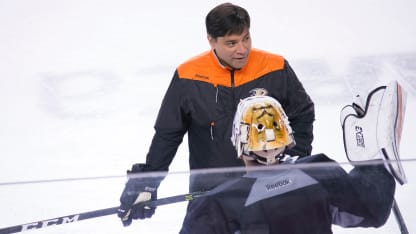
"More and more people of different cultures are getting involved in hockey in general," he said. "I think that's having more of an impact rather than, say myself, being a role model."
Maharaj's early work with Valiquette led him to tutor goaltenders Kevin Weekes and Rick DiPietro before he ultimately landed a full-time position with the Islanders.
When Dwayne Roloson, who played parts of two seasons for the Islanders, stepped down as Ducks goaltending consultant in the summer of 2016 because of family reasons, he recommended Maharaj replace him. Maharaj joined the Ducks before the 2013-14 season as a consultant, focusing on their American Hockey League affiliate in Norfolk, Virginia.
Organizationally, the Ducks have done a good job of developing young goaltenders and helping to salvage the careers of others. Frederik Andersen was traded by the Ducks to the Toronto Maple Leafs on June 20, 2016, for a first-round draft pick in 2016 and a second-round pick in 2017.
Last season, Maharaj helped Jonathan Bernier, now with the Colorado Avalanche, get his career back on track after three tumultuous seasons with the Maple Leafs.
Maharaj's communication skills and empathetic manner allowed him to win the trust of Ducks No. 1 goaltender John Gibson, who is 21-15-6 with a 2.55 goals-against average and .924 save percentage.
"He's always been there for me," Gibson said. "Being together this long, he knows what to expect from me and I know what to expect from him, working on things here and there.
"We just have a good relationship and it makes things a lot easier. And he's just a good person."
Gibson and Maharaj have been through a lot together, from riding buses in the AHL to the three-round journey in the 2017 Stanley Cup Playoffs. Maharaj, 54, has two teenaged daughters, which helps him relate to the younger text-messaging generation.
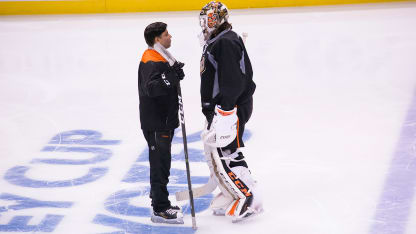
Their relationship benefited from a defining moment when the Ducks lost to the Nashville Predators in the Western Conference Final in six games. Gibson missed the end of the series after he sustained a lower-body injury in Game 5.
After Gibson's official exit interview, he and Maharaj sat down for a follow-up conversation to clarify what they could've done differently.
"There had been some things that weren't working the way we both wanted," Maharaj said. "John and I went into a separate room and we aired out a lot of things we both felt that we weren't happy with.
"It was uncomfortable at times, but it was also cathartic in a lot of ways. I think it was the best moment in our relationship because it cleared a lot of things out of there. Our relationship has probably been the best it's ever been right now."
Maharaj's pre-NHL training served him well in this line of work. He taught grade school in Toronto and later worked with at-risk students. His classroom was often a melting pot with up to 36 students, speaking as many as four or five languages.
"His background in teaching, working with behavioral students has certainly allowed him to work with goalies because we've all got our behavioral issues," said Valiquette, who works as a studio analyst for MSG Network covering the Rangers. "I have a hard time when people ask me about being a goalie because we're a different breed. And why wouldn't we be? Look at what we do for a living.
"On top of that, you're not always going to get a choir boy. It's not always a job you can do in an even mindset, mental state. Sudsie is important in that he keeps us healthy."
Valiquette vividly recalled his first on-ice session with Maharaj.
"He asked me to do an exercise, and go to my knees, and then from my knees, push in one motion back to my left post from the top of the crease," Valiquette said. "I had to rotate and push across and I got myself about halfway through the crease. He looked and me and said, 'Steve, we've got a lot of work to do.'
"I was two months away from going to my first camp with the New York Islanders. I fell in love with him. If he told me to eat lima beans, I'm eating lima beans."
Maharaj's strength is his ability to determine what a certain goaltender needs to work on and then tailors the instruction accordingly. This season, the needs of a veteran such as Ryan Miller, who is 37, are different than Gibson, 24.
"As a former school teacher, I always look at the person first before I look at the position," Maharaj said. "(Gibson's) maturation as a person has certainly been reflected in his maturation as a goaltender. They've happened hand in hand.
"He's much more disciplined in how he's approaching the game. He's always had a great mental game, but he's matched the physical part of that. He's playing a lot more controlled.
"I'd still love him to be a little more controlled, but he's improved. He's not stretching and reaching to the degree that he used to."
Despite his patience and ability to connect with his pupils, Maharaj was not accepted into teachers college once he retired from hockey. His initial application was rejected because he didn't have enough experience. He found a solution before re-applying.
"I was driving a truck and delivering uniforms," he said. "Once I finished my shift, I'd run to public school up the road where I arranged to volunteer for the last part of the day."
His approach to succeeding in hockey was equally dogged; he grew up idolizing Philadelphia Flyers legend Bernie Parent and devoured a goaltending manual by Jacques Plante, who won 437 NHL games with the Montreal Canadiens, Rangers, St. Louis Blues, Maple Leafs and Boston Bruins. He was inducted into the Hockey Hall of Fame in 1978.
Playing hockey was one of the quickest ways to make friends and assimilate in Toronto after arriving from California - that's California, a small town in Trinidad.
Maharaj's father preceded the family to Canada; Sudarshan stayed behind in Trinidad for almost two years, living with his grandmother and great-grandmother.
"It was about a 15-minute drive to the beach," Maharaj said. "You could actually see the coast of Venezuela on a clear day. We didn't have very much money. We would play in the yard with whatever you could make toys with."
It has been a long journey from Trinidad's California to Anaheim, California, an improbable path that is a testament to Maharaj's dedication and perseverance.
"It was amazing," he said. "It was one of those things where I was never a superstar growing up. I was just a hard-working guy. It was until later I realized, 'Hey, you know what? I'm not bad at this.' But I never played at the highest levels growing up, so it was always a fight to get there."




